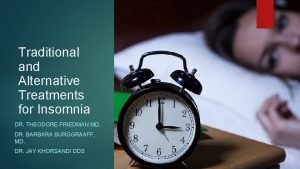Nonpharmacological treatments of insomnia for longterm painful conditions

- Slides: 1

Nonpharmacological treatments of insomnia for long-term painful conditions A systematic review & meta-analysis of patient-reported outcomes in RCTs Tang NKY 1, Lereya ST 1, Boulton H 1, Miller MA 2, Wolke D 1, 2, Cappuccio FP 2 1 Department of Psychology and 2 Warwick Medical School, University of Warwick, UK Studies included were: original randomized controlled trials (RCT); testing a nonpharmacological intervention; that targets sleep; in adults; with painful health conditions; that has a control group; includes a measure of sleep quality; and at least 1 other health and wellbeing outcome. Sleep quality We systematically searched Cochrane CENTRAL, MEDLINE, Embase & Psych. INFO for relevant studies. Interventions: most popular CBT-I components were psycho-education, sleep hygiene, stimulus control, sleep restriction, and cognitive therapy. • Face-to-face = 9; Phone or internet = 2 Pain intensity METHOD Eleven RCTs involving 1, 066 participants (M age 45 -61) from the US, UK, Canada, and Spain provided data for the meta-analysis. • Cancer pain = 6 (mixed types of cancer = 4; breast cancer only = 2) • Non-cancer pain = 5 (mixed types of pain = 2; fibromyalgia only = 3) Fatigue Insomnia is a debilitating comorbidity of chronic pain. This study evaluated the effect of nonpharmacological sleep treatments on patient-reported sleep quality, pain, and well-being in people with long-term cancer and non-cancer (e. g. , back pain, arthritis, fibromyalgia) pain conditions. RESULTS Depression INTRODUCTION At post-treatment: a large improvement in sleep quality (SMD = 0. 78), small reduction in pain (0. 18), and moderate improvement in fatigue (0. 38). At follow-up: effects on sleep quality and fatigue were maintained (up to 1 year) when a moderate reduction in depression (0. 31) was also observed. Both cancer and non-cancer pain patients benefited from nonpharmacological sleep treatments. Face-to-face treatments achieved better outcomes than those delivered over the phone or internet. CONCLUSION Nonpharmacological sleep intervention may represent a fruitful avenue for optimizing treatment outcomes in patient with chronic pain.

